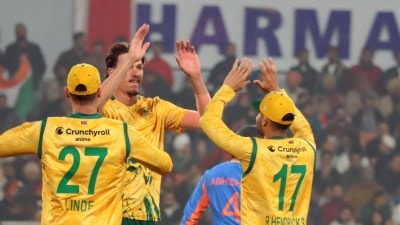Stay updated with the latest - Click here to follow us on Instagram
Tributes pour in as Kothari is cremated
“He is not just known for his contribution to the knowledge of Indian politics and democracy but also as an institution builder," Shail Mayaram.
 Family members of Rajni Kothari at his cremation on Tuesday.
Family members of Rajni Kothari at his cremation on Tuesday.
Last rites for leading political scientist Rajni Kothari, who passed away on Monday, were performed at Lodhi crematorium on Tuesday evening. Those who came to bid adieu to the founding member of Centre for Study of Developing Societies (CSDS) included senior Supreme Court advocate and Aam Aadmi Party (AAP) leader Prashant Bhushan, civil rights activist Agnivesh, leading scholar Pratap Bhanu Mehta, art historian Kapila Vatsyayan, former Delhi University Vice-Chancellor Deepak Nayyar, social scientist Shiv Vishwanathan and politician and former journalist Arun Shourie.
Remembering Kothari, Shail Mayaram, faculty member at CSDS, said, “He is not just known for his contribution to the knowledge of Indian politics and democracy but also as an institution builder. CSDS was a unique experiment — a community of cultural theorists — where dissent and alternative were the primary buzz words. His work highlighted how democracy transformed caste and he spoke about the politicisation of caste. The way in which he changed our understanding of caste and democracy, different from tenets of democratic theory, is equally significant.”
Kothari founded CSDS in 1963 and also started Lokayan (Dialogue of the People) in 1983 as a platform where intellectuals and activists could interact. He was also associated with the Indian Council of Social Science Research, People’s Union for Civil Liberties and International Foundation for Development Alternatives.
Looking at Kothari as a scholar “who understood the importance of non-political party associations”, Peter Ronald D’Souza, faculty member at CSDS, spoke about his association with Kothari.
“In the mid-70s, when I was a student fresh out of college, Kothari had come to Goa to talk to young people about the nature of Indian politics. The interaction took place in a middle school classroom where he spent an entire day talking about politics. We were fascinated,” D’Souza said.
Leading political scientist Aditya Nigam underlined the importance of Kothari’s work in an intellectually autonomous space.
“He continued to be academically productive and work as a public intellectual. He not only had a very strong sense of scholarship but also of autonomy. He saw to the generational transition at CSDS — a phenomenon which is very rare, with CSDS being probably the only institution to have achieved that. Moreover, I identify a lot with his later work on non-party political formations — theorising the crisis of institutions and party politics,” Nigam said.







